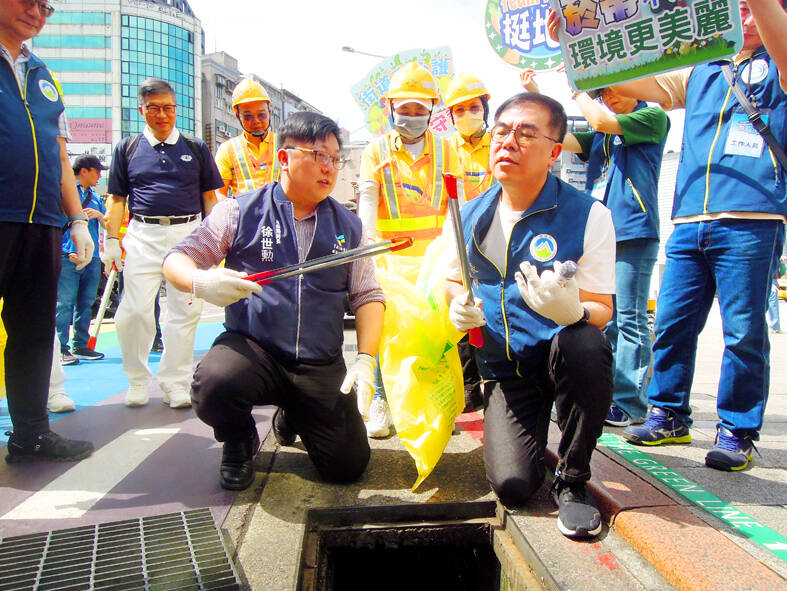About 9 billion cigarette butts are improperly discarded every year, the Ministry of Environment said yesterday as it mobilized 50,000 people nationwide to clean streets.
The ministry yesterday held an environmental clean-up event named “Team Planet” in support of Earth Day on Tuesday.
The event galvanized nearly 50,000 people from enterprises, civic groups and local environmental bureaus across the nation’s 22 administrative areas into taking part in picking up litter on streets, as well as draining water out of containers to prevent the spread of dengue fever.

Photo: CNA
Minister of Environment Peng Chi-ming (彭?明) attended the event in Taipei’s Ximending (西門町) shopping area, saying that maintaining clean streets, keeping cigarette butts of the ground, and preventing dengue fever are the three goals for this year to echo Earth Day.
Streets must be kept clean, as even beautiful places would lose half of their charm if they are defiled with rubbish, he said.
Public environments are mostly kept clean thanks to the efforts of sanitation workers and volunteers, Peng said, adding that more Taiwanese should be aware that littering is illegal.
“Although the number of smokers is decreasing in Taiwan, there are still about 36 billion cigarettes sold every year,” he said.
Improperly discarded cigarette butts could fall into gutters and flow into the ocean, causing marine microbeads to increase, Peng said, calling on smokers to take cigarette butts home for proper disposal.
Taipei Department of Environmental Protection Director Shyu Shyh-shiun (徐世?) also said that discarding cigarette butts into gutters would result in environmental pollution, although some smokers argue that it would be less likely to cause fire.
The Taipei City Government has set up 1,800 cigarette snuffers across the city, more than double the 650 asked for by the ministry, he said.
About 9 billion, or 25 percent, of the 36 billion cigarettes sold every year were improperly discarded, Environmental Management Administration Director-General Yen Hsu-ming (顏旭明) said.
The government would clamp down on cigarette littering at popular smoking spots such as convenience stores or stir-fry restaurants, he said.
Regarding dengue control, data from the Centers for Disease Control has shown that the global dengue fever pandemic peaked last year.
Peng said that global warming has prolonged summers and might lead to an outbreak of the dengue fever epidemic earlier this year.
Dengue fever is no longer limited to southern Taiwan and has infected some people in the north, while other countries such as Japan and South Korea are also carefully preparing for dengue control, he said.
To prevent dengue fever, it is fundamental to frequently check if containers are collecting water, drain the water, dump waste containers, and scrub mosquito eggs from containers, Peng said, calling on people to take the four actions eliminate mosquito habitats around their residence.

Alain Robert, known as the "French Spider-Man," praised Alex Honnold as exceptionally well-prepared after the US climber completed a free solo ascent of Taipei 101 yesterday. Robert said Honnold's ascent of the 508m-tall skyscraper in just more than one-and-a-half hours without using safety ropes or equipment was a remarkable achievement. "This is my life," he said in an interview conducted in French, adding that he liked the feeling of being "on the edge of danger." The 63-year-old Frenchman climbed Taipei 101 using ropes in December 2004, taking about four hours to reach the top. On a one-to-10 scale of difficulty, Robert said Taipei 101

Nipah virus infection is to be officially listed as a category 5 notifiable infectious disease in Taiwan in March, while clinical treatment guidelines are being formulated, the Centers for Disease Control (CDC) said yesterday. With Nipah infections being reported in other countries and considering its relatively high fatality rate, the centers on Jan. 16 announced that it would be listed as a notifiable infectious disease to bolster the nation’s systematic early warning system and increase public awareness, the CDC said. Bangladesh reported four fatal cases last year in separate districts, with three linked to raw date palm sap consumption, CDC Epidemic Intelligence

Taiwanese and US defense groups are collaborating to introduce deployable, semi-autonomous manufacturing systems for drones and components in a boost to the nation’s supply chain resilience. Taiwan’s G-Tech Optroelectronics Corp subsidiary GTOC and the US’ Aerkomm Inc on Friday announced an agreement with fellow US-based Firestorm Lab to adopt the latter’s xCell, a technology featuring 3D printers fitted in 6.1m container units. The systems enable aerial platforms and parts to be produced in high volumes from dispersed nodes capable of rapid redeployment, to minimize the risk of enemy strikes and to meet field requirements, they said. Firestorm chief technology officer Ian Muceus said

MORE FALL: An investigation into one of Xi’s key cronies, part of a broader ‘anti-corruption’ drive, indicates that he might have a deep distrust in the military, an expert said China’s latest military purge underscores systemic risks in its shift from collective leadership to sole rule under Chinese President Xi Jinping (習近平), and could disrupt its chain of command and military capabilities, a national security official said yesterday. If decisionmaking within the Chinese Communist Party has become “irrational” under one-man rule, the Taiwan Strait and the regional situation must be approached with extreme caution, given unforeseen risks, they added. The anonymous official made the remarks as China’s Central Military Commission Vice Chairman Zhang Youxia (張又俠) and Joint Staff Department Chief of Staff Liu Zhenli (劉振立) were reportedly being investigated for suspected “serious